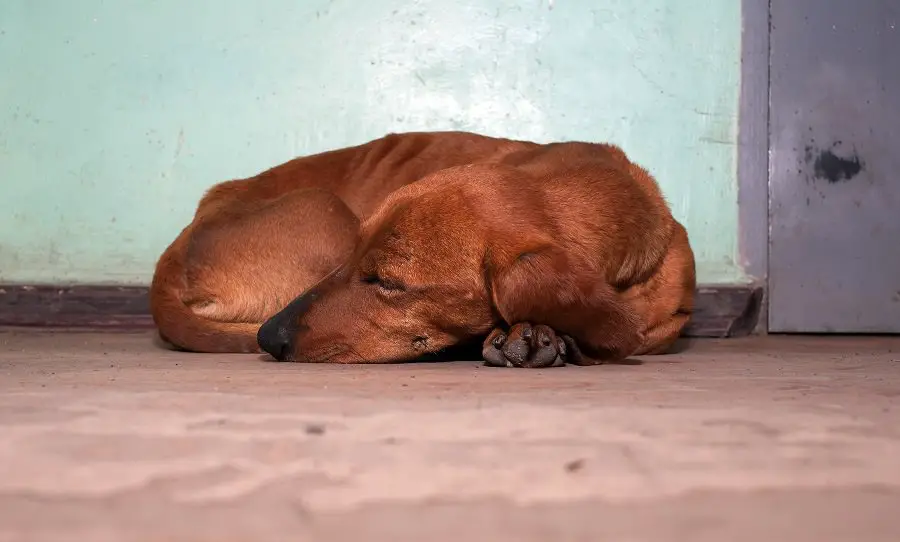Many dachshund owners, and not just new ones, fret over how much their pet seems to sleep.
Their dog either keeps dozing off during the day, after a full night’s sleep, or yawns while you are trying to interact with it.
This can be particularly baffling when considered along with the dachshund’s reputation of being an energetic, lively animal.
Is this propensity to sleep for long hours a sign of laziness? Are there any indications of illness you can gather from your dog’s sleep patterns?

Another common sleep-related query – Is it wrong to get your pets used to sleeping in your bed?
What many owners don’t realize is that the slumber needs of a dachshund are different from other human family members.
12-14 hours of sleep is normal for these pets, and they need sufficient rest to maintain their alertness and jovial temperament.
This can vary depending on age, activity levels and the individual dog too. Changes in sleeping patterns can foreshadow health issues, which we talk about later in this post.
And, no, there’s absolutely nothing wrong in sharing your bed with your dachshund, as long as you keep some basic factors in mind.
Sleep duration
Dachshunds do tend to sleep a lot, with some owners even reporting nearly 70% of the day spent sleeping.
But this is not abnormal behavior in the general context of our canine friends.
On average, most dogs need at least 12 to 14 hours of sleep every day, unlike human beings who manage with 8 hours or less.
Part of the reason is their sleep pattern, which we will come to in a while, but part of it depends on the kind of lifestyle the particular dog leads.
Dogs have a natural instinct, inherited from their ancestors, to preserve energy.
This means that as soon as they notice the lack of any meaningful action around them – read food, play or walk (along with hunting in the case of dachshunds) – they get bored and go to sleep.

So, if your dachshund falls asleep at odd times, it is not because it is lazy, but because it just doesn’t have enough interesting stuff to do.
If it has got work to keep it engaged, or someone or something to play with, it will not sleep as often.
Along with this, if a dog sleeps out of boredom for a good part of the day, it is likely to be sleepless and restive at night.
This translates to insufficient rest at night, leading to sleeping through the day, which becomes a set cycle after a while.
Effect of age
The amount of sleep needed also depends on age, with puppies and older dogs requiring about 18 hours of rest.
As dogs grow old, they begin to lose stamina, and need extra rest after any physical or mental exertion.
For puppies, it is very important to balance exercise and stimulation with plenty of rest if you want them to grow into happy, well-adjusted adult dachshunds.
A new puppy is likely to be restless with its unfamiliar surroundings and might not always lie down and sleep come night time. This needs patience from you.
Dachshund puppies are particularly sensitive, and need to be cuddled to sleep.
If you have seen two or more puppies sleeping together, you would have noticed how they like to sleep close together for comfort.
A newly adopted puppy might need you to sleep with it for a few days to get it accustomed to the new environment.
Take this opportunity to make a sleeping schedule for the pup too – this will help it get used to your lifestyle.
Sleep pattern
You might be familiar with the concept of REM (Rapid Eye Movement) sleep. This is considered the restorative part of our sleep cycle and is needed to wake up refreshed.
Humans, in general, spend 25% of their sleep in REM. This makes 8 hours of sleep sufficient for most of us. Dogs, on the other hand, spend only 10% in REM.
The shorter period of restful sleep means that they need to sleep longer – 12 to 14 hours – to get sufficient REM.
Sleeping positions
If you are a dachshund owner, you must already be familiar with the absolutely endearing sight of your pet lying flat on its back, paws up in the air, with no care in the world.
We suspect dachshunds know how comical they look when they lie down like this, and do it deliberately to make you love them even more.
Sleeping in this position is an indication of the dog being totally at ease as this is a vulnerable position for the dog to be in, exposing its stomach. It might even be a not-so-subtle invitation for a belly rub.
Apart from being a sign of comfort and confidence, sleeping on the back also helps the dog in cooling down, especially after a session of exercise.
You can use this position to check its low chassis for any rashes and its paws for wear and tear.
A dachshund’s back is a very sensitive body part, and if your pet has had issues in this department, it would avoid going on its back on its own or you might have to gently discourage it from doing so.
Here are some other common sleeping positions and what you can infer from them:
Side sleeping

This also indicates a high degree of comfort and trust as the dog is exposed and not in a position to get up immediately when alerted.
Dachshunds can often be found sleeping beside you on their pillow like this, much like a human being.
Tummy curl
Dogs that are gentle and shy tend to opt for this position more often.
This tightly-wound up position, with the front paws tucked backward, prevents the dog’s muscles from relaxing properly, keeping it from entering the REM sleep stage.
So, even if your dog spends long periods sleeping in this position, it might not be getting restful sleep.
Super pup
Seen in high-energy dogs, this position, with the four limbs stretched out, resembles a certain caped crusader’s flying stance.
The position makes it easy for the dog to spring up and get moving, and so is more common for short naps during the day.
Curled up

This indicates that the animal is apprehensive about a new environment or people around it. Or it could just be that the dog wants to keep warm by preserving heat.
Back-to-back
If you have more than one dachshunds at your home, you will often find them sleeping with their backs touching – a remnant of huddling together for protection and warmth in the wild.
Of course, they will want to try it out with their human companions too.
Sleep location
Beds
While dachshunds tend to fall asleep at any place they feel comfortable at, it helps to have one or two set locations inside your house where they know they are meant to sleep.
Dachshunds love sharing their human master’s bed, and most owners are perfectly happy obliging them.
In fact, it is common to come across dachshund owners who wouldn’t have it any other way.
Once you get used to having this lovable, and loving, creature beside you in bed, it is difficult letting go of the habit.
There is nothing inherently wrong with letting your dachshund into your bed.

You just might want to ensure that, given the amount of exploration it does through the day, it is wiped clean before it gets on to the bed.
Once it is there, be prepared for some antics though. It might want a short play time before it finally decides to retire, and you should humor it.
During the night, do not be shocked if it rotates around on the bed and wakes you with a kick.
And don’t get too possessive of your duvet – a dachshund doesn’t always appreciate the size difference between itself and its human companion and will try to hog the duvet or blanket if it feels cozy under it.
Small dogs that were bred for hunting, like terriers and dachshunds, also show their heritage of flushing out animals from tunnels by burrowing into blankets.
This is a manifestation of their instinct to relax in a small and protected place, which keeps them warm and safe.
You also need to be careful about how you move at night yourself. These small creatures, especially when they are puppies, can easily get stuck under you.
Of course, dachshunds are very mindful of their comfort in this regard – if they don’t enjoy their sleep on your bed, they will find another avenue.
If you or your partner tend to snore at night, you will find that your dachshund moves towards your feet to sleep, or gets off the bed altogether.
Crates
Crate training is always useful for dachshunds, particularly if you are allergic to dog hair or just not too keen on sharing your bed for some reason.
A crate might feel too much like a cage to some dachshund lovers, but given the dog’s size and its natural instinct to seek enclosed and cozy spaces, this is not a bad idea at all.
Crate training can be useful in other ways too:
-It is a safe place to leave the dog when you are not around to supervise it.
-Prevents accidental escape when you have workmen or guests in your home likely to leave doors and gates ajar.
-Necessary for safe transportation of the dog.
-Can simplify house training as dogs are naturally reluctant to soil the area where they sleep.
-Provides a safe refuge to the dog if it needs to calm down or deal with a fearful situation.
A plastic or wire cage that allows the dog to stand erect and turn around is ideal. Furnish it with a mat or blanket and a couple of chew toys.
Place it somewhere in your house where the dog can view your movement easily. At night, move the crate to your bedroom.
When to be concerned
If you notice any drastic change in the sleeping patterns of your dachshund, you should observe for any signs of illness and bring to a veterinarian doctor for evaluation.
Back problems can make the dachshund avoid lying on its back or curling up – if it used to sleep commonly in either of these positions, but doesn’t now, you should promptly get it checked.
An illness is more likely to make the dog sleepier than usual. Narcolepsy – a disorder that affects a dog’s ability to stay awake for extended periods of time – is an inherited condition in dachshunds.
Episodes of narcolepsy tend to occur when there is positive stimulation like food or play.
Prior genetic testing can help reliably determine if your adopted dachshund is likely to suffer from this.
Other conditions that can cause sleepiness include:
-Hypothyroidism
-Diabetes
-Parovirus
-Distemper
-Kennel cough
-Heartworm
-Leptospirosis (There are vaccinations commonly available for this, but miniature dachshunds tend to develop allergic reactions to them, so your attempt at prevention should not result in other issues.)
-Heart disease
-Liver disease
Other factors like depression, old age, inactivity or poor quality food can also lead to sluggishness.
A healthy dachshund will sleep comfortably through the night, provided you have set the right habits, and will be interested in all activities during the day, even if it takes power naps during interludes.
The best way to ensure this is to engage your pet in at least 30 minutes of physical activity every day, keep it mentally stimulated and shower it with love.
